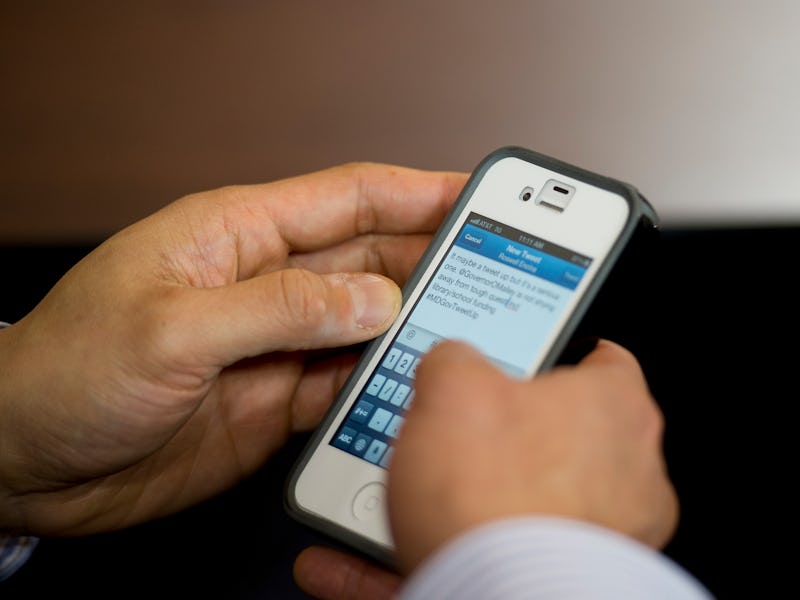Comedy Pioneered Twitter's Voice. Then Brands Ruined It.
Pusher ads and bot-driven hashtags have made the social media space a dreary place.

Six years ago, I performed stand-up comedy in a remote armpit of the world called southeast Michigan.
There were exactly two open mics in the area that were worth an amateur comedian’s time. They were hosted at the Comedy Showcase in Ann Arbor — where I lived — and at Mark Ridley’s Comedy Castle in Royal Oak.
Ridley’s was a glittering jewel. Autographed glossies of established mainstream comedians like Tim Allen and Roseanne Barr covered the walls. The crowd was always reasonably sized — a Big Deal in Michigan, where seven nights out of nine you’d be telling jokes to a room of dregs, mostly other open mic comedians.
In a word, Ridley’s oozed stand-up history. But for my money, I preferred the Comedy Showcase. For starters, the manager, Roger, gifted comedians two free drinks — or one Long Island iced tea — for performing. It wasn’t quite the same as getting paid, but the liquid dose of confidence was essential in steadying the amateur comedian’s hand, and voice, before he or she went on stage.
Ridley’s had hosted the big names, but the Comedy Showcase was the Castle’s hip, offbeat cousin. Instead of Tim Allen and Roseanne, it was Emo Phillips and Maria Bamford on the walls. At the Showcase, I was fortunate to watch talents like Ricarlo Flanagan:
… and Matt McClowry …
… establish themselves as legit comedians, voices who have since gone on to better circuits.
As for the rest of us, we weren’t much good. We flopped, we hacked, we cursed and told a lot of masturbation jokes. It was no fun going last on open mic night. The audience, by that point, was all masturbationed-out. Boredom, or contempt, would have greeted even humankind’s greatest jerkoff joke.
We consoled ourselves by establishing a thriving community of comedy, irreverence and wit on Twitter. There was something comforting, non-invasive, even uncorrupted, about Twitter in the early days.
It was on the bow of the SS Tweetdeck (before the ship was bought and scuttled for parts) where we promoted and retweeted each other and refined our material. Something about telling jokes in a curated, impersonal environment where the size of the audience, and the laughs, were purely theoretical made being an open mic comedian way more fun.
The temptation now is to speak of this time as a golden era, before the social media giant became a cultural wasteland, a monetized behemoth of pusher ads and bot-driven commercial hashtags, where celebrities with alliterative initials that will otherwise not be named promote products on their personal accounts.
If true, then this golden era had its golden calf. His name is Neil Hamburger:
The thing with Hamburger was that he was vulgar, unpleasant, unfunny, abrasive, dated — and all intentionally so. Hamburger was that glorious inversion, an anti-comedian. The multiple cocktails tucked into his nether arm. The groans, the complaining, the mannered speech. Hamburger was a walking calamity, a diseased throwback to an era of comedy best left smothered.
You were supposed to hate Hamburger, and love the fact that he was no good — all the while appreciating that he wasn’t real, which let everyone in on the joke.
On Twitter, Hamburger’s (aka Gregg Turkington) idea of a good joke was to retweet the inane monologue coming from fast food Twitter accounts with retorts about how the food actually tasted and what it did to a person’s body upon consumption.
(Sadly, Twitter’s redesign, involving the blockboxing of retweets, means jokes like this now have to be read backwards, like a Jeopardy! question.)
The other approach Hamburger had (and one he still takes) was to retweet an absurd number of tweets people had posted about how sick the food at certain establishments made them.
Leaving aside how doubly funny it is that a comedian as deliberately vulgar as Neil Hamburger would be criticizing Burger King and Taco Bell for being disgusting, one should admire this joke-approach for, if not speaking truth to power, at least clowning on the bland, corporatist chatter streaming out of official Twitter channels.
But these jokes were more than just jests. They were harbingers for what Twitter would become. This is par in American culture — the youthful rebellion of today is always the commercially packaged pandering of tomorrow — but it’s particularly depressing to watch it happen to Twitter. This place used to be cool, man.
Twitter isn’t fun(ny) anymore. Oh, jokes get told. But they’re spoken in the same parlance, using the same language, that the comedians who once trolled them used. And instead of rejecting this stuff, we ask @Whataburger for a follow, because who doesn’t want more followers? In place of conversations — which do, occasionally, occur — Twitter is becoming a series of monologues it would take weeks of curation to filter out. It should surprise no one that #tbt is a treasured Twitter custom. The past drives tweeting, as some kind of reassurance for how far we’ve come.
Well, if it’s burgers the audience wants, my money goes to Neil.
Instruments like Twitter have cycles. In the beginning, there’s something raw and formless about the tool. It was precisely that formlessness that allowed hack comedians from Southeast Michigan to wield Twitter as we saw fit: by riffing on and ripping off each other.
We’re in a mature stage now, the time of throwbacks. On Twitter, every night is open mic night, every moment is open mic moment, but instead of taking to the stage to speak truth, the loudest voices talk about products. Marketing teams drive the discussion. Content displaces discontent. Brands talking to brands, and the audience, on the other side of the squeaky-clean glass, taking the show in.
Who made that glass so squeaky-clean? I blame Clorox.
Yes, and #ImOldEnoughToKnow you ruined Twitter.